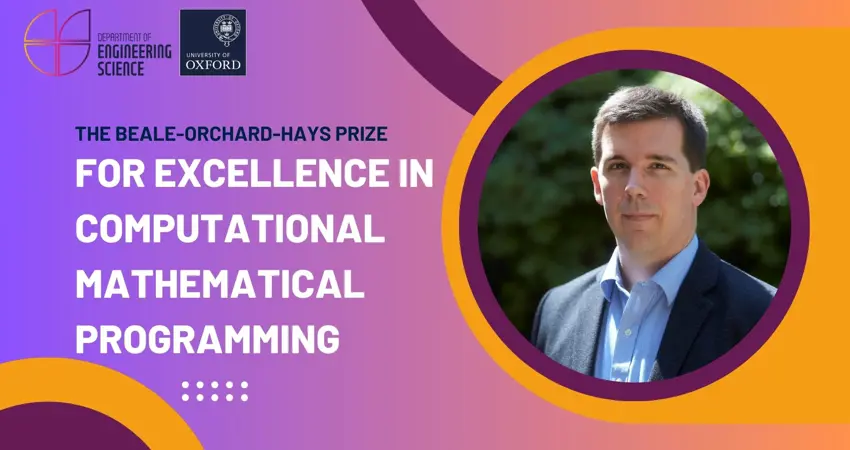16 Aug 2024
Computational Mathematical Programming paper wins Beale-Orchard-Hays Prize for Excellence
Professor Paul Goulart and co-authors received the prize for a 2020 paper presenting OSQP, a general purpose solver for quadratic programs

Associate Professor of Engineering Science Paul Goulart and co-authors recently received the ‘Beale-Orchard-Hays Prize for Excellence in Computational Mathematical Programming’ from the Mathematical Optimization Society (MOS). The prize is awarded once every three years and is presented at the awards session of the International Symposium on Mathematical Programming.
Professor Paul Goulart joined the University of Oxford in 2014 and is a member of the Department of Engineering Science’s Control Group where his research interests are mainly in robust and high speed optimisation and control, with a wide range of application areas including fluid flows, economics and traffic networks.
The co-authors of the OSQP paper are Bartolomeo Stellato and Goran Banjac, both former Engineering Science DPhil students supervised by Professor Paul Goulart; Alberto Bemporad from IMT Institute, Lucca; and Stephen Boyd from Stanford University.
The prize was awarded for the paper ‘OSQP: an operator splitting solver for quadratic programs’, which was published in Mathematical Programming Computation, Vol.12, 2020. The paper presents a general purpose solver for quadratic programs based on the alternating direction method of multipliers, employing a novel operator splitting technique that requires the solution of a quasi-definite linear system with the same coefficient matrix in each iteration. Numerical results show that the algorithm is able to provide up to one order of magnitude computational time improvements over existing commercial and open-source solvers on a wide variety of applications.
In awarding the prize, the MOS committee commended the robust implementation of the software, with attention to issues such as preprocessing problem instance and detecting infeasibility; the careful and extensive numerical testing in the paper; the long list of users and successful practical applications of the software, and the impact the paper has already made on the field. OSQP has shown a large impact with tens of thousands of users both in academia and in large corporations.




